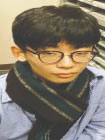
Jino Huh / Crean Lutheran HS 12th grade
If there is one prominent distinction that can be made between cultures, language is what I believe forms the culture’s identity. Language demonstrates the identity and creates more character for the country. It explains history, shows what is to come, and illustrates the people now. Understanding language will help people acknowledge the sheer value of other countries and possibly learn how to deal with other cultures.
What sparked my interest in understanding cultural characters were untranslatable words. Most countries that have their own distinct language tend to have words that only suit to their particular culture and can only be understood in their context.
For example, the word ‘nunchi’, in Korea, is a frequently used word. ‘Nunchi’ is generally an ability to read one’s mind so that he or she can take care of one’s mind. Although defined like such in the Korean dictionary, the word is used in different ways to convey one’s social skills or express tension between conversations.
Koreans are the only ones who use such words; thus, I wanted to determine what led to the rise of the word. Most Koreans, before Korean language was invented in the 16th century, used Chinese letters to study and communicate. Although they had their own speaking language, Chinese is what Koreans used to read and write.
Nunchi, however, is not a Chinese-driven language. It is pure Korean, which means Korean ancestors created this word to portray some cultural notion.
It dates all the way back to when Confucius’ texts were introduced to Koreans. Confucianism was brought to Korea soon after it was invented. Koreans used Confucianism for its education and introduced Confucius’ texts so that civilians can learn and make their way into the Korean government(regime). Confucianism sheer value comes from respecting the elder and the teacher. It shows how one must be considerate with all circumstances and act or speak with such cautions. Koreans were taught to react accordingly so that they do not get in trouble with the authorities or, in a global scale, the Chinese regimes.
Not only do we have to date back a couple centuries, but also couple a decades to show why nunchi is such a prominent word in Korea. Koreans during mid 20th century were conquered by the Japanese: Japanese Colonial Era(1905-1945). Japanese authorities were trying to restrict the Koreans from fighting back against the Japanese regime so that the idea of an independent Korea does not brainwash the Koreans. The Koreans, thus, were treated with a limited Japanese education with restrictions in never being able to be exposed to the Korean language. Koreans had to give their authorities positive impressions so that they did not get in trouble. Getting in trouble for Koreans during the Japanese Colonial Era was being shot and getting beheaded so that the authorities will hang their heads on one of Korea’s main streets so that other Koreans don’t even try to make trouble or revolt. Koreans were seeing ‘nunchis’ so that they are not condemned by the Japanese authorities. Koreans obviously wanted independence and to successfully execute the activities against Japanese regime, they had to act accordingly to buy no suspicion and avoid getting killed. Apparently, the existence or the nonexistence of ‘nunchi’ was life or death for Koreans. It is easy to tell why the word is so often used.
According to research conducted by Chungang Papers, nunchi is one of the most frequently used words used by Korean employees. It is said that employees would talk about how hard it is to not have your boss or your employer offended by their words. Even in family units, kids have ‘nunchi’ for their parents so that they don’t get scolded. If you think about it, it’s a global thing. People appreciate those who are street smart. Generally, people who are better at reading the atmosphere and acknowledging one’s mood have more friends. It’s just in Korea, people are so fed up with taking care of other’s mood or reading the atmosphere so that you are not condemned in the back, they have a specific word for detailing their everyday life.
<
Jino Huh / Crean Lutheran HS 12th grade>

